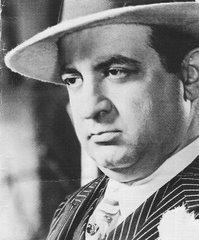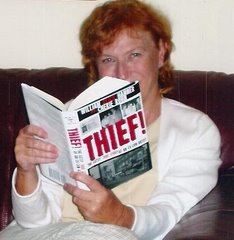

 Starting today I'm posting Slick's new take on Las Vegas: Slick Hanner's Las Vegas--Then & Now, a chapter at a time. We would like to hear your feedback.
Starting today I'm posting Slick's new take on Las Vegas: Slick Hanner's Las Vegas--Then & Now, a chapter at a time. We would like to hear your feedback.Slick Hanner's Las Vegas
THEN & NOW
by
William "Slick" Hanner, George Joseph & Cherie Rohn
Who is William “Slick” Hanner?
In the early 1930s, I grew up on Chicago’s North Side. I was a truant and hung out with a gang. I ended up quitting school in the third grade. We were in the middle of World War II and it seemed like every one under the age of 60 was in the service. Nobody cared about a dirt poor Irish kid named Billy Hanner who skipped school looking for adventure.
Me and my friends sneaked into the movies to see our favorite actors—James Cagney, Humphrey Bogart, Paul Munie, George Raft and Edward G. Robinson. Hollywood glorified gangsters, making them the idols of my day. But even real gangsters had their good sides. During the Great Depression, they sponsored soup kitchens and gave to the needy who included practically everyone I knew.
Me and my friends sneaked into the movies to see our favorite actors—James Cagney, Humphrey Bogart, Paul Munie, George Raft and Edward G. Robinson. Hollywood glorified gangsters, making them the idols of my day. But even real gangsters had their good sides. During the Great Depression, they sponsored soup kitchens and gave to the needy who included practically everyone I knew.
It was 1947 and the war was over. Truant officers and police were back in full force looking for me. At only 15 I was too young to enlist, so I got myself a phony birth certificate. My brother, a war hero, signed as my legal guardian and I joined the Army Air Corps. The minute I got to basic training it split into two separate branches: the Army and Air Force. After basic, they sent me to Albrook Field in the Panama Canal Zone. The canal was a shortcut for ships between the Atlantic and Pacific Oceans. I was surprised the first time I went swimming. Oceans weren’t like Lake Michigan…they had a lot of salt.
To get out of work, I joined the boxing team. We fought Fort Clayton whose guys beat the hell out of me. Of course I was just a skinny runt and those guys were almost professional boxers. Anyway, my commanding officer wasn’t too happy with me so he sent me to Las Vegas Air Force base (Now Nellis) to build parking lots. When I got my orders, it said Las Vegas, Nevada, but my friends insisted it was Las Vegas, New Mexico. No one had ever heard of Las Vegas, Nevada, an outpost in the desert.
In 1949, I got an honorable discharge, my first real accomplishment. I couldn’t wait to get back to Chicago and that old gang of mine. I was 17, fell in love and married the woman who would become the mother of four of my children. Now my life was very different as a married man with kids. I wasn’t used to having responsibilities.
One thing didn’t change…I still wanted to be a gangster. With that sort of goal, it wasn’t long before me and my buddies ended up as convicted armed robbers. Now I was a felon, a lot worse than a gangster. As a convicted felon, you lose your civil rights. The state of Illinois owned me and my felony cost me my wonderful wife.
One thing didn’t change…I still wanted to be a gangster. With that sort of goal, it wasn’t long before me and my buddies ended up as convicted armed robbers. Now I was a felon, a lot worse than a gangster. As a convicted felon, you lose your civil rights. The state of Illinois owned me and my felony cost me my wonderful wife.
I soon found out something else that disqualified me as a hardcore gangster. I couldn’t hurt innocent people. That and the fact that I refused to follow orders made it impossible for me to be a gangster.
In 1970, I wound up in Las Vegas again. Now everyone had vacationed there or at least heard of the place. There was no question who really ran things in Las Vegas—The mob. Many of them were mob guys I knew, while living at Chicago Outfit headquarters, who had been sent out to Las Vegas. Now it was easy to get a job. I had what they call “juice,” or pull. All I had to do was register with the Las Vegas Police Department to get a convicted felon or gaming card which let you work in casinos. That meant I could legally be a dealer, shift manager or poker room manager, all jobs I held at one time or another.
When gaming started to open up in other states, I ran gambling schools and trained dealers in Louisiana and New Mexico. I met a writer named Cherie Rohn. Together we wrote my life story, a book called Thief. I went back to Las Vegas to retire. But seeing how much it had changed prompted me to write this book—the way I remember Las Vegas.



No comments:
Post a Comment